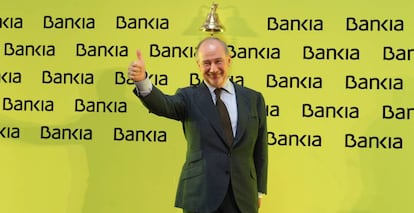Ex-IMF chief Rodrigo Rato acquitted over Bankia IPO fiasco
Spain’s High Court also cleared 33 other defendants accused of fraud in connection with the 2011 listing of a bank that had to be bailed out a year later

A Spanish court has acquitted 34 defendants, including former International Monetary Fund (IMF) chief Rodrigo Rato, who had been accused of fraud against investors and false accounting in connection with the 2011 listing of the lender Bankia.
The criminal division of Spain’s High Court (Audiencia Nacional), on Tuesday found that Bankia executives did not provide misleading information to retail and institutional investors, as the anti-corruption prosecutors had held. In July 2011, Bankia was floated on the Spanish stock exchange at €3.75 a share. Less than a year later, that price had plummeted to around €1.00 and the bank was bailed out in 2012.
The heads of the Bank of Spain and the CNMV at the time were also investigated for a while
The court also found that the Initial Public Offering (IPO) prospectus contained “ample and accurate” information about the bank, and that its flotation had been greenlighted by all the supervisors: the Bank of Spain, the securities commission CNMV, the Fund for Orderly Bank Restructuing (FROB) and the European Banking Authority (EBA).
Rodrigo Rato was at the time chairman of Bankia, which was itself the merger of seven struggling savings banks in the wake of the financial crisis that began in 2008. But in May 2012, just two years after its creation, the lender had to be partly nationalized to prevent a complete collapse. A review of Bankia’s earnings statement for 2011 showed that instead of turning a profit of €309 million as reported, the lender had in fact lost nearly €3 billion.
Rato, who was also Spain’s economy minister with the conservative Popular Party (PP) in the late 1990s and early 2000s, is currently serving a four-and-a-half-year prison sentence in Soto del Real (Madrid) after being found guilty of embezzlement in a separate case involving Bankia and the use of corporate credit cards for private expenses. Tuesday’s favorable decision in the IPO case could make it easier for him to be granted a semi-open prison regime in the coming weeks.
Consumer reaction
Consumer groups from the banking sector reacted negatively to the ruling. Patricia Suárez, president of the Association of Financial Users (Asufin), on Tuesday described it as “disappointing, incoherent and a source of astonishment.”
Other groups made similar appraisals. “This is a historic ruling, in terms of the impunity it establishes with regard to the catastrophic bankruptcy of Caja Madrid and six other savings banks, and the ensuing damage to nearly 400,000 small savers whose savings were compromised,” said Manuel Pardos, president of Adicae, which represents insurance and banking customers.
The Spanish Association of Minority Shareholders (AEMEC), which was a party to the legal proceedings as the private prosecution, has said that it will appeal the ruling.
The Tuesday ruling comes as Bankia is involved in a high-profile merger with CaixaBank to create Spain’s biggest lender with €650 billion in assets. José Ignacio Goirigolzarri, who took over from Rato at the helm of Bankia following its bailout in 2012, is set to become the chairman of the new lender that comes out of the tie-up.
The court took nearly a year to reach a decision following 74 hearings where judges heard 34 defendants, 57 witnesses and 20 expert witnesses. Prosecutors had sought an eight-and-a-half-year prison sentence for Rato.
Rato, who became chairman of Bankia in January 2010, has never considered himself responsible for the problems that led to the bank’s spectacular demise two years later, ruining thousands of small savers who had bought shares besides nearly bankrupting the country itself with at €22.4 billion bailout paid with taxpayers' money in the middle of a tremendous crisis. Throughout the trial, Rato maintained the same line of defense: that the Bank of Spain was aware of, and approved, everything that went on at Bankia.
The heads of the Bank of Spain and the CNMV at the time were also investigated for a while, but the legal proceedings against them were dropped in 2017. The High Court now finds that the prosecution did not accuse the defendants of specific enough charges but merely of “generic attitudes.”
With reporting by Iñigo de Barrón, Elena G. Sevillano, Oscar López-Fonseca and L.D.F.
English version by Susana Urra.
Tu suscripción se está usando en otro dispositivo
¿Quieres añadir otro usuario a tu suscripción?
Si continúas leyendo en este dispositivo, no se podrá leer en el otro.
FlechaTu suscripción se está usando en otro dispositivo y solo puedes acceder a EL PAÍS desde un dispositivo a la vez.
Si quieres compartir tu cuenta, cambia tu suscripción a la modalidad Premium, así podrás añadir otro usuario. Cada uno accederá con su propia cuenta de email, lo que os permitirá personalizar vuestra experiencia en EL PAÍS.
¿Tienes una suscripción de empresa? Accede aquí para contratar más cuentas.
En el caso de no saber quién está usando tu cuenta, te recomendamos cambiar tu contraseña aquí.
Si decides continuar compartiendo tu cuenta, este mensaje se mostrará en tu dispositivo y en el de la otra persona que está usando tu cuenta de forma indefinida, afectando a tu experiencia de lectura. Puedes consultar aquí los términos y condiciones de la suscripción digital.








































